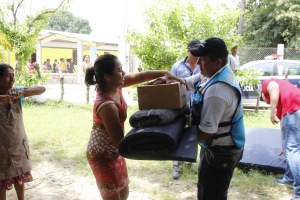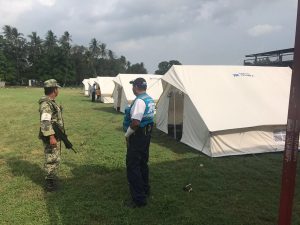The industry launched donation campaigns to help victims and institutions, allowed open Wi-Fi access, provided free communications and restored damaged infrastructure within 24 hours of the earthquake.
On 19 September 2017, while Mexico was commemorating the 32nd anniversary of the catastrophic 1985 earthquake and 12 days after an 8.2 magnitude quake killed 100 people and caused considerable damage in Chiapas and Oaxaca, the earth shook once more. The 7.1 magnitude September earthquake was centred in the Puebla area and the worst hit locations were Puebla, Morelos and Mexico City.
Damage to infrastructure and response
The main incidents and outages in telecommunications networks and services were caused by power cuts, damage to buildings used as telecommunications sites and nearby properties, difficulties in restoring fuel to power plants supplying the affected areas, and civil defence security closures that protected damaged installations and enabled rescue work but delayed network restoration.
 The Federal Telecommunications Institute (FTI) reported damage to 93 sites in the capital city. Operators AT&T, Telefónica Movistar and TELCEL, working with the Secretariat of Communications and Transport, FTI and civil defence, activated the security and redundancy protocols in the networks to counter the damage to the infrastructure and restore service in the affected locations. As a result, 98 per cent of public telecommunications networks were fully operational within 24 hours.
The Federal Telecommunications Institute (FTI) reported damage to 93 sites in the capital city. Operators AT&T, Telefónica Movistar and TELCEL, working with the Secretariat of Communications and Transport, FTI and civil defence, activated the security and redundancy protocols in the networks to counter the damage to the infrastructure and restore service in the affected locations. As a result, 98 per cent of public telecommunications networks were fully operational within 24 hours.
Amid the chaos, Mexico’s mobile industry was an example of coordination and readiness to serve and assist the population. Immediately after the earthquake, AT&T, Telefónica Movistar and TELCEL announced that their calls, SMS and data were available free of charge and even made communication available for customers with no credit on their phones. Telcel and Telefónica Movistar allowed unlimited access to Whatsapp, Twitter and Facebook for 10 days. TELMEX gave open access to its more than 5,500 Wi-Fi sites and public telephony to support earthquake victims. In addition to facilitating communication, which is essential during emergencies and crises, mobile operators implemented a number of initiatives to support affected populations and victims and help with reconstruction:
- AT&T offered free calls, text messages and mobile data so their customers in Mexico could stay connected. For customers in the United States, the company issued credits and waived charges on calls and texts to Mexico. The operator enabled customers in Mexico to make donations via SMS and launched a fundraising campaign in which their staff in North America took part. It announced a $1 million donation to help relief and recovery efforts in affected communities and organised fundraising among its staff. All the contributions will be sent to the National Epidemic and Disaster Support Centre (CENACED), a non-profit organisation that works in awareness, prevention, care and social recovery during disaster in Mexico. AT&T also donated equipment and technology to ensure connections for shelters, collection centres, hospitals and civil society organisations.
- TELCEL, Telmex, the Carlos Slim Foundation and TELMEX TELCEL Foundation delivered 138 tonnes of humanitarian aid to stricken areas in the states of Oaxaca, Chiapas, Puebla, Morelos and Mexico, including 900 tents, 15 drinking water plants, 34,000 food packs, 15,500 mattresses, and blankets and medicines. They also set up 50 camps for volunteers and support teams working in affected areas and launched a plan to contribute five Mexican pesos for every peso donated through calls to Telmex 01800, SMS to TELCEL *55666 and deposits made into an Inbursa account. Donations of 391,181,007.42 pesos were added to the 1,955,905,037.10 peso contribution from the Carlos Slim Foundation, giving a final total of 2,347,086,044.52. The funds raised will be used for the rescue of victims and their care at shelters, structural protection of heritage assets at risk, reconstruction and refurbishment of health centres and schools, construction of better quality and safer housing, reconstruction of damaged markets and construction of sports facilities as an additional contribution, in coordination with local authorities. The administration, machinery, equipment, staff and materials for the rescue and reconstruction activities were provided free of charge by the Carlos Slim Foundation, Grupo Carso, Telmex and Telcel.
- Telefónica Movistar provided free voice browsing, SMS and Whatsapp in Mexico City and affected populations in Puebla and Morelos, extended free browsing for five days and suspended debt collection measures. Free calling to Mexico was available from Argentina, Chile, Colombia, Costa Rica, Ecuador, El Salvador, Guatemala, Nicaragua, Panama, Peru, Uruguay and Venezuela. Fundación Telefónica organised a collection of food and medicines and delivered them through Telefónica Volunteers. The Foundation set up a three-month donation platform and invited society to contribute. Telefónica will triple the money collected on the platform, ensuring a donation of at least $1 million. Many Telefónica volunteers took part in reconstruction, refurbishment and support activities in the worst hit areas. During International Volunteer Day, 800 people joined efforts to support affected populations at five locations in the central region of the country.
“For Fundación Telefónica it’s essential that help isn’t limited to these few days, because we know what the affected communities are going to need in the coming months, primarily Mexico’s children, who must keep up with their studies and prepare for tomorrow. Our children are our future and we’ll continue to give them opportunities to move ahead through our education, social and cultural projects, reaffirming our commitment to Mexico,” said Nidia Chávez, Director of Fundación Telefónica Mexico, on 19 September.
 “The earthquake caused considerable damage in many of our communities and that means major, ongoing recovery efforts will be necessary,” said Kelly King, CEO of AT&T, in Mexico. “We hope the AT&T donation and contributions from our staff in North America and customers in Mexico will support the recovery work for the many people, homes and communities affected,” Mr King added.
“The earthquake caused considerable damage in many of our communities and that means major, ongoing recovery efforts will be necessary,” said Kelly King, CEO of AT&T, in Mexico. “We hope the AT&T donation and contributions from our staff in North America and customers in Mexico will support the recovery work for the many people, homes and communities affected,” Mr King added.
“After the September earthquakes, the people of Mexico are more united than ever. At this difficult time, as on other occasions, Telcel has joined the effort and the commitment of thousands of people by providing free voice services, texts and data through our network across the country to facilitate coordination of the rescue and aid work carried out by authorities and volunteers, ensuring everyone in Mexico can contact their loved ones,” said Daniel Hajj, CEO of Telcel.
The FTI announced that Telecomm offices, Mexican Postal Service and the 1,700 connection points in the Connected Mexico programme had enabled password-free access to their networks. In the days immediately after the earthquake, the rural satellite telephone service in the affected states (about 200 telephones) was free of charge.
Once again, mobile operators were essential in ensuring the communications of Mexico’s mobile users and demonstrated their strong corporate commitment to support affected communities and lead the reconstruction efforts that Mexican society needs.